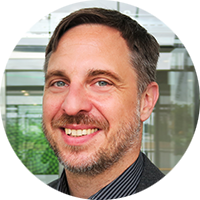Smart City Freiburg: Blazing trails for the city of the future.
One of Freiburg’s ambitious goals for the future is to create a complete, real-time digital twin of the city’s bike traffic. Well, it was one of their goals.
Written by

“There was a point when we had to say: It can’t be done,” says Michael Bauder, sub-project manager with the smart city project, DATEN:RAUM:FREIBURG, in Germany’s southernmost metropolis. The reason? Comprehensive data on the city’s cycling traffic, which is in fact available e.g. through movement data collected from mobile phones, cannot be accurately mapped to the cycling network, and isolating cyclists from pedestrian and motor traffic would add significant complexity and lag. Other data sources scattered throughout the city, such as fitness apps, are far away from being representative, as are one-off and selective snapshots, e.g. related to car free day campaigns.
Focus on sensor-driven real-time capture.
There’s no point beating around the bush, says Michael Bauder, so it was back to the drawing board. The trade-off was to either ditch the goal of being real-time, or achieving city-wide coverage. After revisiting the goal, the project will now focus on real-time capture of bicycle traffic at select points across the city to generate a continuous stream of data that will provide insights into current traffic, e.g. during events.
When trying things, you’re allowed to fail.
“We can’t afford to shy away from failure,” says Michael Bauder. “There are simply things that we cannot change, that we have to accept and move on. What matters is what you do with your learnings and how you steer the project in a new direction.” The project is a prime example of how Freiburg goes about digitalisation today–build a prototype for a specific use case, give it a whirl, and if the team can see that something doesn’t work, they can make adjustments very early into the project to optimise the eventual real-time application. Michael Bauder sums up the approach: “If we fail, we do so when we’re testing something out, not when we’re running it for real.”. This may ring of a certain US start-up mentality, but in Freiburg it comes from a need to break free from traditional and time-hardened patters because they are a bad fit.
There a lot that’s unknown, that’s unclear, that’s new—and it’s all dynamic. And there’s so much to do that we’ll be busy for years.
Michael Bauder, sub-project manager with the smart city project, DATEN:RAUM:FREIBURG
Digitalisation takes a bold and open mindset.
For Michael Bauder, two factors are key to ensure the long-term success of a digitalisation project: You have to be bold. And you have to be open. “We’ve learned a lot from earlier projects and talking with stakeholders in other communities.” The team’s own experience with IT infrastructures and a healthy interest in open-source software also play a role. In the case of Freiburg, creating a smart-city product that should be able to be run and evolved by a variety of companies means that using standards and interfaces that work now isn’t enough, they also have to click in the future. This takes precisely the sort of bold and open mindset that has made Freiburg a much-respected and praised digital trailblazer in urban development, and in particular in mobility.
Freiburg’s digital strategy.
In numerous workshops, the city of Freiburg gathered the desires, needs, and concerns of its citizens with respect to digitalisation in order to find answers the question, “Where does Freiburg want to be?” These were organised into a variety of topics that informed the fundamental digitalisation strategy and areas of action. In order to keep both feet on the ground, they were put into a set time frame. At the heart of the strategy is the project named DATEN:RAUM:FREIBURG (the “Freiburg Data Room”). In 2025, the city is planning to take stock and realign its digitalisation strategy with reality and integrate new technologies, new ideas, and new influences.
It’s about what the people get out of it.
Freiburg is happy to receive such praise, but takes it with a pinch of salt. Michael Bauder adds some perspective: “They say we’ve covered exceptional ground, but that’s not true. When I look at the international field, others are way ahead of us.” Be that as it may, Freiburg is still aiming high—and keeping its goals aligned with the needs and expectations of the people who are at home here. In the end, their work will be judged by what it does for them.
Experience shows you the way.
Before the smart city project eventually goes live, a continued willingness to learn and optimise the project with growing experience along the way is a priority. Simply put, experience is how Freiburg finds the right way. “That’s precisely what we do with Bechtle: We’re hiking some ambitious trails together”, says Bauder. “Sometimes that means blazing new ones altogether. And Bechtle has just the right mindset and skillset to pull off the DATEN:RAUM:FREIBURG.”
What are smart-city concepts even about?
“Long-term collaborations and community-centred thinking are critical factors for the success of digitalisation projects in general, and even more so when we’re talking smart city,” says Claudius Schaufler, Senior Expert Smart City at Bechtle. “In Freiburg, we work as equal partners with the city and three other technology providers to develop solutions one step at a time that can unfold tremendous potential when we correlate the data they consume.”
When you join the dots in a digital city model, it becomes much easier to see dependencies, visualise changes, and take more appropriate action. This could be the connection between urban soil sealing on the one hand and an increase of the surrounding temperature on the other, or between retail sales and available parking and accessibility by public transport or bike.
Ultimately, it allows a city to develop based on actual and verifiable facts, and at a faster pace, too. And that’s what’s happening in Freiburg right now—the evolution of a future-aware, urban infrastructure that will live up to functional requirements and social needs today and long after the government funding period has ended.
Did you know…?
DATEN:RAUM:FREIBURG.
The Freiburg Data Room, stylised as DATEN:RAUM:FREIBURG, is a smart-city beacon project that aims to connect and collate data that exist across a variety of sources in order to enable analyses and, ultimately, new applications. The goal is to create a functional data infrastructure and make it available for all future smart-city use cases by 2025.
The current focus is on mobility, urban simulation, and connected participation. Two prototypes are being developed and tested, one being a digital marketing platform for urban properties, the other an overview of mobility data in Freiburg with the goals of creating a digital twin of the Dietenbach district and optimising traffic across the city.
Germany’s Federal Ministry for Housing, Urban Development and Building is injecting a sum of 8.3 million euros into the project, with an additional 4.5 million euros approved by the Freiburg city council. The funding period stretches until the end of 2025.
Innovation procurement.
Innovation procurement is an EU instrument designed to guide Europe-wide tenders, and in particular digitalisation projects. Instead of demanding specific end results, it allows the commissioned companies to develop a consecutive series of individual milestones. If the results fail to meet expectations, it is possible to switch individual companies, and if they stray too far from the objective, the tender may be halted altogether. Freiburg has chosen this approach because the city has found more traditional instruments for public buying to be inadequate when it comes to digitalisation.
